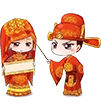春节的意义.-春节的意义英文表述简短
- 菊韵
- qiazhi
- 2024-01-28 18:26:01
1 春节的意义.
春节是关键的传统节日,标志着农历新年的开始。作为人,春节对来说具有深远的意义。
春节象征辞旧迎新 寒冬腊月结束和新生活的开始。这个时刻视为一种新的开始,人们可以放下过去的不快与困扰,并期待一个更佳的将来。在春节期间,人们一般会清洁家园,打扫过去一年的尘埃,意味迎接新的开始和新的机遇。
春节亦是亲人团聚的时刻。对于在外工作或求学的人来说,春节是他们回家重聚的机会。很多人会提前计划好回家与家人团聚,共度这个特别的时刻。在春节的前一天,全家人会一同吃年夜饭,团聚一堂,享受美食,并互相祝福。这个传统不仅仅是为了满足生理需求,更关键的是家人间的情感交流和亲密关系的维系。
春节还有一个关键的意义是对传统文化的弘扬。是个拥有悠久历史和丰富文化传统的,而春节正是这些传统文化的缩影。在这个节日里,人们会制作年画 贴春联 点亮烟花爆竹 包饺子。这些习俗都源于悠久的历史,并代代相传,作为文化的组成部分。
春节亦是表达祝福和感恩的时刻。人们会去拜访亲朋好友,交换新春祝福,并赠送红包。红包象征好运和吉祥,对新年的祝福。在这个特别的节日里,人们也会向长辈致敬,表达感激,并帮有要的人,这体现了*重视亲情和友情的传统价值观。
春节亦是文化交流的平台。在各地,人们会展示各自的传统文化习俗,比如舞龙舞狮 鞭炮舞狮 京剧表演。游客也可以在春节期间参与这些活动,了解的文化多样性,并与当地人民一同欢庆节日。
春节对于人民来说,有着深远的意义。代表了新的开始 团聚 传统文化的延续 祝福和感恩的表达,亦是展示文化的关键平台。春节是人民对过去一年的总结,以及对将来的期许和希望。不管身在何处,都会时刻铭记春节的关键性,并用来纪念和延续你的文化传统。

2 春节的意义英文表述简短
The Meaning of the Spring Festival
The Spring Festival, also known as the Chinese New Year, is one of the most important traditional holidays in China,It is celebrated on the first day of the lunar calendar, which falls between January 21st and February 20th.
The Spring Festival holds significant cultural and historical meanings for the Chinese people,It symbolizes the arrival of spring and new beginnings,The festival is a time for family reunions, where people travel long distances to be together with their loved ones,It is estimated that millions of people in China make the journey back home during this period.
During the Spring Festival, various customs and traditions are observed,Red is the predominant color, as it is believed to bring luck and ward off evil spirits,People decorate their homes with red lanterns, couplets, and paper cuttings,Firecrackers are set off to scare away evil spirits, and dragon and lion dances are performed to bring good luck and prosperity for the upcoming year.
One of the most important customs of the Spring Festival is the family reunion dinner, known as "nianyefan." Families gather around a table full of delicious food, sharing laughter, stories, and blessings,It is believed that the more people in attendance, the more prosperous and happy the family will be in the coming year.
Another significant tradition during the Spring Festival is the exchange of red envelopes or "hongbao." Married adults give red envelopes, filled with money, to children and unmarried adults as a symbol of good luck and blessings for the new year,It is a gesture of love, gratitude, and well-wishing.
The Spring Festival is also a time for paying respects to ancestors and deities,Many people visit temples and burn incense to pray for good fortune and blessings,They also clean their homes thoroughly before the festival begins, symbolizing the removal of bad luck and making room for good luck to enter.
Furthermore, celebrating the Spring Festival involves many traditional activities such as setting off fireworks, watching traditional performances, playing traditional games, and honoring cultural heritage,The festival creates a festive atmosphere that brings joy, happiness, and togetherness to the entire community.
In recent years, the Spring Festival has gained international recognition, and more and more people around the world are joining in the celebrations,It is a time where people from different cultural backgrounds come together to learn about and appreciate Chinese traditions and customs.
In conclusion, the Spring Festival holds a significant meaning for the Chinese people,It represents new beginnings, family reunions, cultural heritage, and the fostering of love, gratitude, and good fortune,As the festival continues to evolve and embrace diverse cultures, it not only maintains its roots but also becomes a symbol of friendship and unity among people worldwide.








